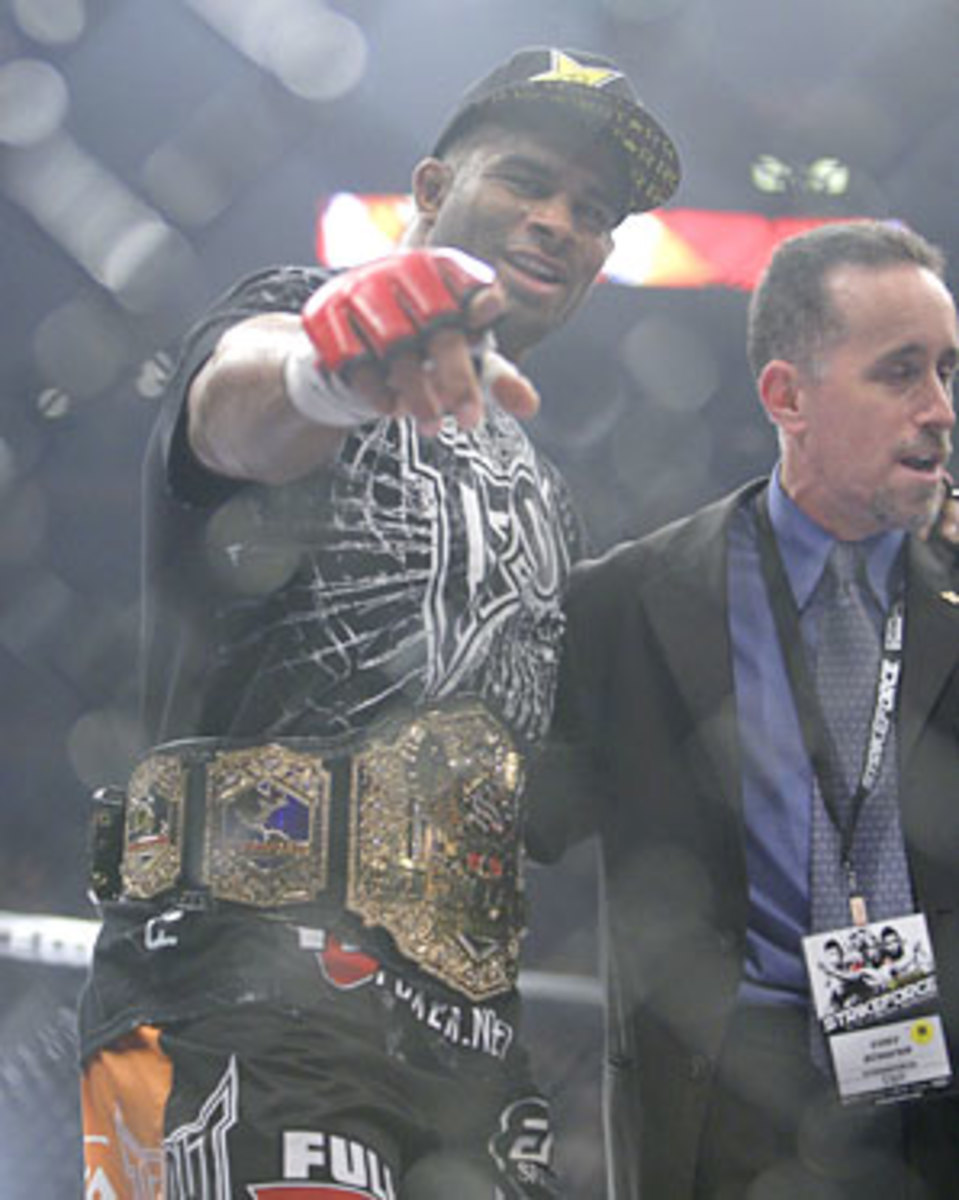Overeem looks part, but resume pales compared to reputation


Alistair Overeem, who owns about as many heavyweight titles he never defends as he does wins over impressive opponents, is a fraud. At those moments when you are tempted to think that fighting is, for all its bright promise, about the most thoroughly debased sport one can follow, think of this thick rope of Dutch muscle and despair.
This Saturday in Dallas, Overeem will take the first really serious fight he's had in four years, a quarterfinal bout in the Strikeforce Heavyweight Grand Prix. If he beats Fabricio Werdum, it will be, speaking generously, the fourth impressive win in a long career, and the first since 2006. That such things can be said of a man widely, if inexplicably, held to be one of the best heavyweights in the world makes him a fine example of what you might call the B.J. Penn Fallacy.
The Penn Fallacy occurs when a fighter is thought of as top rank despite there being no evidence that he is. It holds theory above practice and style above achievement, and lends support to all promoters who seek to carefully manicure the images of fighters who look or talk a part they can't actually play. It negates the very point of fighting, which is that it is a sport in which a man is wholly accountable for, and judged by, what actually happens in his fights. It is bad, and ought to be done away with.
B.J. Penn deserves to have the fallacy named after him because he is widely thought of as a top welterweight contender despite not having won an important fight in that division since January of 2004, and thought of by many as the uncrowned lightweight champion even though he was thrashed twice by Frankie Edgar, his obvious better, last year. No amount of evidence that Penn is not actually a great fighter will ever convince some large part of the public that he isn't one, because he looks like one, has the physical skills of one, and occasionally does things that a great fighter might do, such as lick an opponent's blood off his gloves. The mere invocation of his name creates a quantum phenomenon, where failures are evidence of superiority and results don't matter.
Similarly, even though there is no real reason to think that Overeem is a top fighter, he is commonly thought of as one. You don't have to ask too many hardcore fans to find one who thinks he ought to get the next shot at the UFC title. You don't have to ask too many more to find someone who thinks he's the best heavyweight alive.
Why is this so? He knocks people out, he has been successful in another sport, he has title belts to wear, and his freakish muscles have muscles of their own to flex. All of this makes him seem like the sort of person who ought to swan around as a great heavyweight. That none of this counts for anything -- that physique doesn't rate in fighting, that a title belt you won by beating a bum and don't defend may as well have been bought on Craigslist, and so on -- doesn't quite seem to matter.
This is bewildering. Overeem has fought 46 times, and has had every opportunity to establish himself as the man. His most impressive wins are a submission of and a decision over Vitor Belfort (himself a great beneficiary of the Penn Fallacy) and a knockout of Sergei Kharitonov. That's it. He spent the majority of his career as a guy good enough to face, but not good enough to beat, real top fighters like Chuck Liddell, Mauricio Rua and Antonio Rogerio Nogueira. What made Overeem's reputation coming into the Grand Prix is a win in a K-1 tournament, which is only slightly more relevant than what he might do in a pickup game on a YMCA court, and a string of wins in the last four years against such has-beens as Mark Hunt, Gary Goodridge and Kaz Fuijita and dubious prospects as Brett Rogers and Todd Duffee. In perhaps his toughest test, a fight against a corpse-like Mirko Filopovic in 2008, he distinguished himself mainly by repeatedly striking his opponent in the groin. Imagine a pro basketball player dunking on fossils at old-timer's games for four years and then beating his chest over it while a cheering section proclaims him the best hoopster alive, and you have the last several years of Overeem's career.
All of this has somehow made him the heavy betting favorite over Werdum, a man who for whatever his flaws has already beaten Overeem, in addition to Fedor Emelianenko, Antonio Silva and Gabriel Gonzaga, among others.
You have to like style in fighting. It would be wonderful if B.J. Penn were some multidisciplinary dynamo capable of holding down titles in multiple weight classes at once, if Vitor Belfort were a uniquely dangerous tactician equally capable of knocking a man out with championship-caliber boxing or tapping him with deadly secrets learned while taking in the inner mysteries of Gracie jiu-jitsu, and if Alistair Overeem were in fact some deadly Dutch cyborg capable of decapitating championship-level heavyweights at will. All of it might be true; there is no reason to think any of it is. Overeem could well win Saturday. If he does, it would be the first time in years he's given the public a reason to take him seriously.
